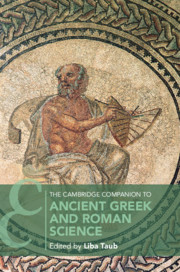Book contents
- The Cambridge Companion to Ancient Greek and Roman Science
- Other Volumes in the Series of Cambridge Companions
- The Cambridge Companion to Ancient Greek and Roman Science
- Copyright page
- Contents
- Contributors
- Acknowledgements
- Introduction
- 1 Presocratic Natural Philosophy
- 2 Reason, Experience, and Art: The Gorgias and On Ancient Medicine
- 3 Towards a Science of Life: The Cosmological Method, Teleology, and Living Things
- 4 Aristotle on the Matter for Birth, Life, and the Elements
- 5 From Craft to Nature: The Emergence of Natural Teleology
- 6 Creationism in Antiquity
- 7 What’s a Plant?
- 8 Meteorology
- 9 Ancient Greek Mathematics
- 10 Astronomy in Its Contexts
- 11 Ancient Greek Mechanics and the Mechanical Hypothesis
- 12 Measuring Musical Beauty: Instruments, Reason, and Perception in Ancient Harmonics
- 13 Ancient Greek Historiography of Science
- Bibliography
- Index Locorum
- General Index
- Other Volumes in the Series of Cambridge Companions (continued from page ii)
6 - Creationism in Antiquity
Published online by Cambridge University Press: 17 January 2020
- The Cambridge Companion to Ancient Greek and Roman Science
- Other Volumes in the Series of Cambridge Companions
- The Cambridge Companion to Ancient Greek and Roman Science
- Copyright page
- Contents
- Contributors
- Acknowledgements
- Introduction
- 1 Presocratic Natural Philosophy
- 2 Reason, Experience, and Art: The Gorgias and On Ancient Medicine
- 3 Towards a Science of Life: The Cosmological Method, Teleology, and Living Things
- 4 Aristotle on the Matter for Birth, Life, and the Elements
- 5 From Craft to Nature: The Emergence of Natural Teleology
- 6 Creationism in Antiquity
- 7 What’s a Plant?
- 8 Meteorology
- 9 Ancient Greek Mathematics
- 10 Astronomy in Its Contexts
- 11 Ancient Greek Mechanics and the Mechanical Hypothesis
- 12 Measuring Musical Beauty: Instruments, Reason, and Perception in Ancient Harmonics
- 13 Ancient Greek Historiography of Science
- Bibliography
- Index Locorum
- General Index
- Other Volumes in the Series of Cambridge Companions (continued from page ii)
Summary
Natural teleology, associated above all with Aristotle, and dealt with in a separate chapter of this volume, seeks to establish and elucidate the explanatory role of purposive structures and processes in the natural world, especially biological. Acorns exist for the sake of producing oak trees, eyelids for protecting the eyes. Natural teleology may or may not go on from there to seek the explanatory role of larger cosmic features, such as the shape and position of the earth. Much less does it need to ask – although it is not debarred from asking – the even bigger question, of how those structures and purposes came to be present in the first place. Thus it comes with no unavoidable theological implications.
- Type
- Chapter
- Information
- The Cambridge Companion to Ancient Greek and Roman Science , pp. 121 - 140Publisher: Cambridge University PressPrint publication year: 2020

